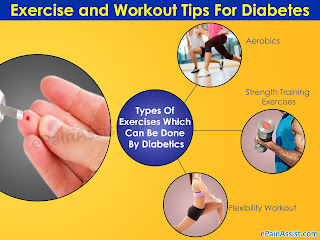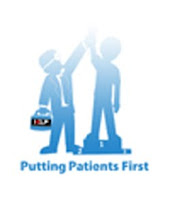Saturday, October 29, 2016
Practicing Gratitude
Gratitude is saying "thank you." But it's more than a thank-you to a friend for a favor or gift. Gratitude is saying thanks for everything that is important to you and good in your life. You are thankful for a gift, but you're also thankful to watch a sunset, do well at a sport, or to be alive. You see your life and your experiences as a gift............Learn More..........http://www.healthlibrary.com/practicing_gratitude.htm
Friday, October 28, 2016
Thursday, October 27, 2016
Prediabetes
Prediabetes is a term that is used when you are at risk for type 2 diabetes. It means that your blood sugar is higher than it should be. Most people who get type 2 diabetes have prediabetes first. The good news is that lifestyle changes may help you get your blood sugar back to normal and avoid or delay diabetes...........Learn More.......http://www.healthlibrary.com/prediabetes.htm
Wednesday, October 26, 2016
Preventing Tetanus Infections
You can help prevent tetanus by having all of the suggested tetanus shots (immunizations). There are three different types of tetanus shots................Learn More...........http://www.healthlibrary.com/preventing_tetanus_infections.htm
Tuesday, October 25, 2016
Probiotics
Probiotics are bacteria that help keep the natural balance of organisms (microflora) in the intestines. The normal human digestive tract contains about 400 types of probiotic bacteria that reduce the growth of harmful bacteria and promote a healthy digestive system. The largest group of probiotic bacteria in the intestine is lactic acid bacteria, of which Lactobacillus acidophilus, found in yogurt with live cultures, is the best known. Yeast is also a probiotic substance. Probiotics are also available as dietary supplements...........Learn More.............http://www.healthlibrary.com/probiotics.htm
Monday, October 24, 2016
Gas (Flatus)
Gas (flatus) is made in the stomach and intestines as your body breaks down food into energy. All people pass gas, some people more than others. It is normal to pass gas from 6 to 20 times per day. Learn More...............http://www.healthlibrary.com/gas_flatus.htm
Saturday, October 22, 2016
Folic Acid Deficiency Anemia
Folic acid deficiency anemia happens when your body does not have enough folic acid. Folic acid is one of the B vitamins, and it helps your body make new cells, including new red blood cells. Your body needs red blood cells to carry oxygen. If you don't have enough red blood cells, you have anemia, which can make you feel weak and tired. So it's important that you get enough folic acid every day. Learn More.....http://www.healthlibrary.com/folic_acid_deficiency_anemia.htm
Friday, October 21, 2016
Eye Problems, Noninjury
Many people have minor eye problems, such as eyestrain, irritated eyes, or itchy, scaly eyelids (blepharitis). These problems may be ongoing (chronic) but usually aren't serious. Home treatment can relieve the symptoms of many minor eye problems.......Learn More.....http://www.healthlibrary.com/eye_problems_noninjury.htm
Thursday, October 20, 2016
Vitamin B12 Deficiency Anemia
Having vitamin B12 deficiency means that your body does not have enough of this vitamin. You need B12 to make red blood cells, which carry oxygen through your body. Not having enough B12 can lead to anemia, which means your body does not have enough red blood cells to do the job. This can make you feel weak and tired. Vitamin B12 deficiency can cause damage to your nerves and can affect memory and thinking.........Learn More.........http://www.healthlibrary.com/vitamin_b12_deficiency_anemia.htm
Wednesday, October 19, 2016
Diabetes: Dealing With Low Blood Sugar
Review the symptoms of low blood sugar if you have diabetes or some other health condition that can cause low blood sugar. Know the early symptoms. You may not always have the same symptoms. Learn More...........http://www.healthlibrary.com/diabetes_dealing_with_low_blood_sugar.htm
Tuesday, October 18, 2016
Monday, October 17, 2016
Saturday, October 15, 2016
You can safely exercise when you have diabetes..........Learn More........http://www.healthlibrary.com/tips_for_exercising_safely_when_you_have_diabetes.htm
Friday, October 14, 2016
Preventing Falls: Exercises for Strength and Balance
As people age, they lose muscle strength, which can make them more likely to fall. Also, their reflexes slow down. This makes it harder for them to regain their balance if they start to fall. Learn some strength and balance exercises, and take the time to do them each day. This can help you stay active and independent.
Thursday, October 13, 2016
Preventing Foot Cramps
Tips to prevent foot cramps...........Learn More.........http://www.healthlibrary.com/preventing_foot_cramps.htm
Wednesday, October 12, 2016
Prevent Medical Errors
Medical errors are mistakes in health care that could have been prevented. They can occur in hospitals, clinics, surgery centres, doctors' offices, nursing homes, pharmacies, and your home. Errors can involve medicines, surgery, diagnosis, home treatment, equipment, or lab reports. They are often caused by a lack of good communication. Medical errors may result in injury or death......Learn More......http://www.healthlibrary.com/prevent_medical_errors.htm
Monday, October 10, 2016
Ringing in the Ears (Tinnitus)
Many people experience an occasional ringing (or roaring, hissing, buzzing, or tinkling) in their ears. The sound usually lasts only a few minutes. Ringing in the ears that does not get better or go away is called tinnitus. You may hear a sound, such as a ringing or roaring, that does not come from your surroundings (nobody else can hear it). The sound may keep time with your heartbeat, it may keep pace with your breathing, it may be constant, or it may come and go. Tinnitus is most common in people older than age 40. Men have problems with tinnitus more often than women............Learn More.......http://www.healthlibrary.com/ringing_in_the_ears_tinnitus.htm
Saturday, October 8, 2016
Tips for Maintaining Weight Loss
Having regular low-calorie snacks throughout the day along with regular smaller meals is a good way to manage your hunger. Plan snacks as part of your overall calories for the day, and avoid eating unplanned calories............Learn More..........http://www.healthlibrary.com/tips_for_maintaining_weight_loss.htm
Friday, October 7, 2016
Choosing a Vitamin and Mineral Supplement
A vitamin and mineral supplement provides a variety of nutrients that are also found in food. These supplements are often called multivitamins. They come in the form of pills, chewable tablets, powders, and liquids..........Learn More..........http://www.healthlibrary.com/choosing_a_vitamin_and_mineral_supplement.htm
Thursday, October 6, 2016
Tips for Swallowing Medicines
Some people have a hard time swallowing medicines. Large pills or capsules can get stuck in your throat, especially if your mouth is dry. Sometimes stuck pills can lead to heartburn and other problems. ........Learn More..http://www.healthlibrary.com/tips_for_swallowing_medicines.htm
Wednesday, October 5, 2016
Jock itch (tinea cruris) is a form of ringworm. Ringworm is not a worm at all. It is a fungal infection of the outer layers of skin, hair, or nails. Fungi (plural of fungus) are present everywhere in our environment. Learn More..........http://www.healthlibrary.com/jock_itch.htm
Tuesday, October 4, 2016
Tim's Story: Dealing With Trauma And Grief
As a medic in Iraq, Tim was always in the midst of suffering. He treated soldiers with horrible wounds. He saw some die. Within one day of returning home, he faced another trauma. Learn More............http://www.healthlibrary.com/dealing_with_trauma_and_grief.htm
Monday, October 3, 2016
Parkinson's Disease
Parkinson's disease affects the way you move. It happens when there is a problem with certain nerve cells in the brain...Learn More......http://www.healthlibrary.com/parkinson's_disease.htm
Saturday, October 1, 2016
Influenza (Seasonal Flu)
Influenza (flu) is a viral infection. People often use the term "flu" to describe any kind of mild illness, such as a cold or a stomach virus, that has symptoms like the flu. But the real flu is different. Flu symptoms are usually worse than a cold and last longer. The flu usually does not cause vomiting or diarrhea in adults........Learn More.......http://www.healthlibrary.com/influenza.htm
Subscribe to:
Comments (Atom)























